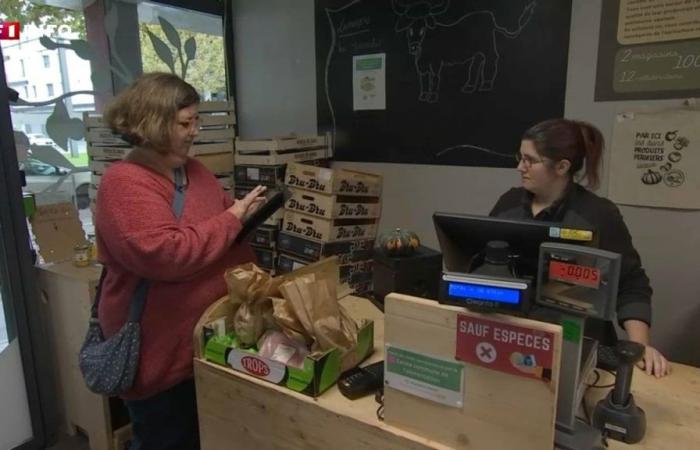
To enable the most modest to buy fruit and vegetables, the Institut Montaigne is proposing the establishment of a food voucher of 30 euros per month.
An experiment of this type is being carried out in Gironde, and the first feedback is positive.
The TF1 JT explains how it works.
Follow the full coverage
The 1 p.m.
In a report from the Montaigne Institute published last week, the respective bosses of Coopérative U, BEL (Babybel) and Sodexo submitted several recommendations to combat food insecurity. They call in particular for taxing sugary products more to finance the establishment of a 30 euro check dedicated to the purchase of fruits and vegetables for the 4 million poorest French people.
In its report, the Montaigne Institute recalls that one in five adults suffer from obesity in France. Figures mainly due to “a worrying increase in unbalanced food choices, marked by a diet that is too rich, too high in calories, and too processed, while the consumption of fruits and vegetables remains insufficient”. The Institute recommends introducing this check in a manner “temporary, until 2027, with an evaluation of its effectiveness at this date in order to decide on its possible extension”.
Stop worrying and tell yourself that every day, we will eat our fill.
Christelle, a resident of Bordeaux who is experimenting with a food currency
In the meantime, experiments already exist to help the most modest to access quality products. In Gironde, for example, a sort of social security for food has been set up. To the delight of Christelle, who testifies in the TF1 news report to be found at the top of this article. For six months, this resident of Bordeaux has been able to afford fresh fruits and vegetables in her grocery store. “I’m going to buy some apples to make compote”, she explains to our camera.
This unemployed mother and her partner receive 1,500 euros per month together. With such an income, it is particularly impossible for them to buy turkey escalopes, priced at 15.20 euros per kilo in the supermarket where the family does their shopping. “It was more of a need, I was fulfilling a need. Whereas there is also the pleasure of eating, of cooking”she confides. From now on, she can pay directly on her phone with MonA, that is to say food currency.
Here’s how it works: for a contribution of 25 euros per month, their household obtains 300 euros. “No longer worry and tell yourself that every day, we will eat our fill. I was depriving myself. It was going to be a pasta dish or a puree, but I didn’t eat meat so that I could leave my daughter in eat”she remembers.
A new clientele
Like Christelle, 400 households in Gironde are experimenting with this social food security. Everyone contributes each month according to their means. The money collected is then redistributed: 150 euros per person, to be spent with selected merchants. Like at the Bègle market where our team went. Mathieu, a beneficiary, contributes a little more than others. He earns more than the minimum wage and contributes 50 euros per month. “I contribute what I want. And we will give according to our means, receive according to our needs”, he emphasizes.
Since the implementation of this experiment, merchants have seen new customers arrive. “There are young people who come, there are people who before didn’t take much, now who take more. There, they know that if they come, they will be able to at least buy something anyway”says a market gardener. It must be said that on average, items sold on this market cost 20% more than in supermarkets. For example, count 1.90 euros per cucumber individually, which is 30 cents more than in the supermarket.
-
Read also
Promised, debated, abandoned… is the food check back?
The department assumes its wish to change eating habits. “Today, quality food is reserved for some. And when we talk about universality, it’s good to put everyone on the same level of capacity”, argues Corinne Martinez, vice-president in charge of finance and public procurement of the department.
The experiment with this food check ends in April 2025. The Gironde department is looking for a way to make it sustainable.





